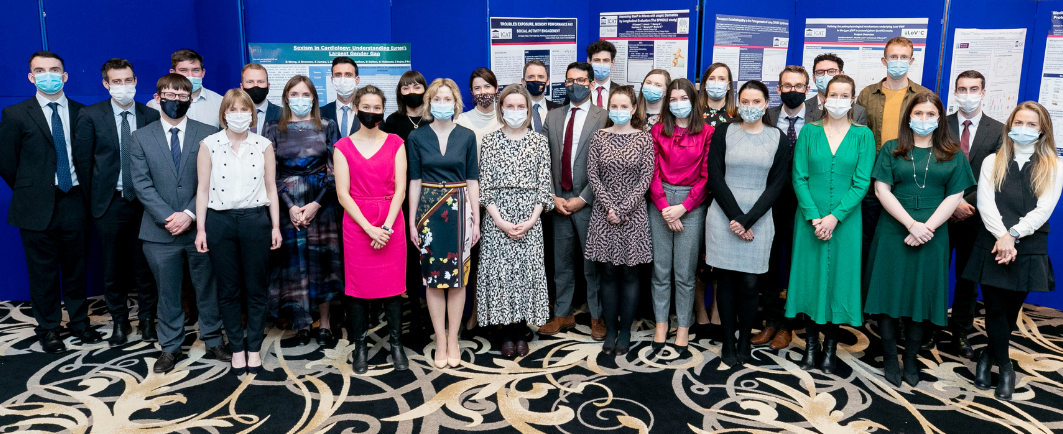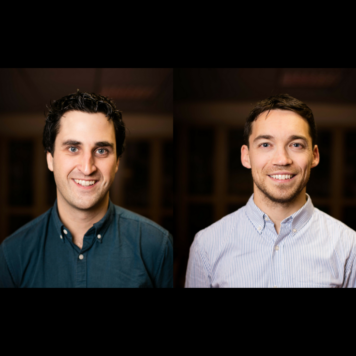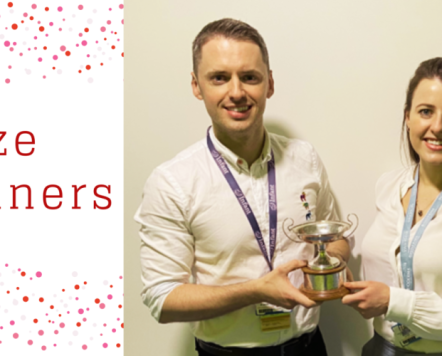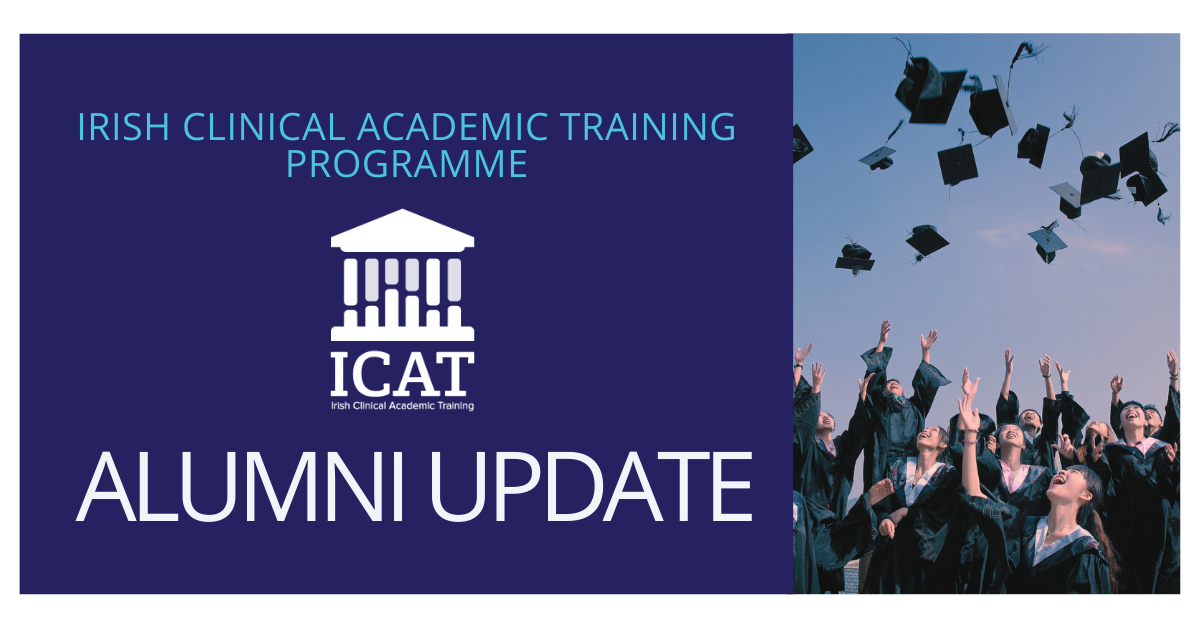
ICAT Alumni Update – David Mongan
September 28, 2021
ICAT Alumni Update – Peter Barrett
February 23, 2022
The 5th annual ICAT Retreat took place on the 25th and 26th November 2021. Due to the COVID-19 pandemic we decided to keep the event as small as possible and while it was disappointing not to be able to include our wider network, it was fantastic to be able to get our fellows together. Many of our fellows joined the programme during the pandemic with its associated public health measures, and it has been very difficult to build the peer support network that is so important for their wellbeing and career development.
The event kicked off with presentations from our year 1 ICAT fellows. These fellows were appointed in July 2021 to the pre-PhD year of the programme, in which they are predominantly clinically-based but have protected time to identify a supervisory team, develop a PhD proposal and submit this for internal then external review. The ICAT Retreat is an important part of the internal review process, with a Q&A after each talk and plenty of opportunity during the breaks to discuss their project plans during the 2-day event.
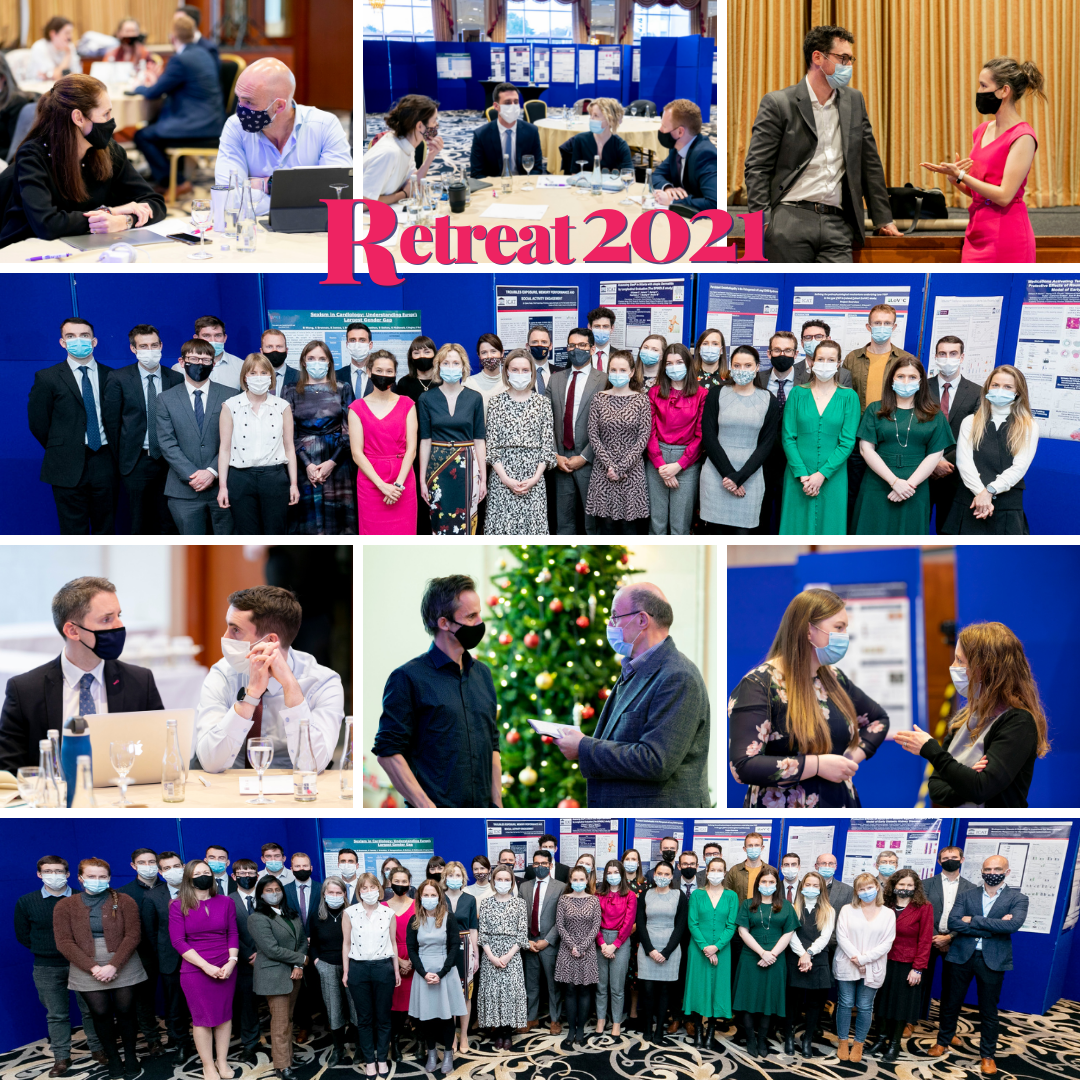
Due to the increasing number of ICAT fellows as we appoint a new cohort each year, the fellows who are in their PhD years participated in a Research Blitz on Thursday afternoon. The session was great fun and you can see some of the speakers photographed below. Each speaker was allowed 3 minutes and 3 slides to showcase a snapshot of their research, with scientific posters outlining their projects in more detail.
In addition to our fellows, we were very happy to see some of our new alumni in attendance. Our first cohort of fellows were appointed in 2017 and have completed/are due to complete their PhDs in 2021-2022. Specific tailored alumni sessions were held for those attending and our new Alumni Committee will be expanding the training and support opportunities for ICAT alumni in 2022.

We were lucky to have some fantastic invited speakers who joined us for the event, introducing the fellows to the SFI Centre for Research Training in Genomics Data Science and the importance of critically analysing data (Professor Cathal Seoighe), One Health and its integration with human health challenges such as antimicrobial resistance and the emergence of zoonotic diseases (Professor Deabhaile Morris) and how to incorporate public and patient involvement in research (Ms Edel Murphy). 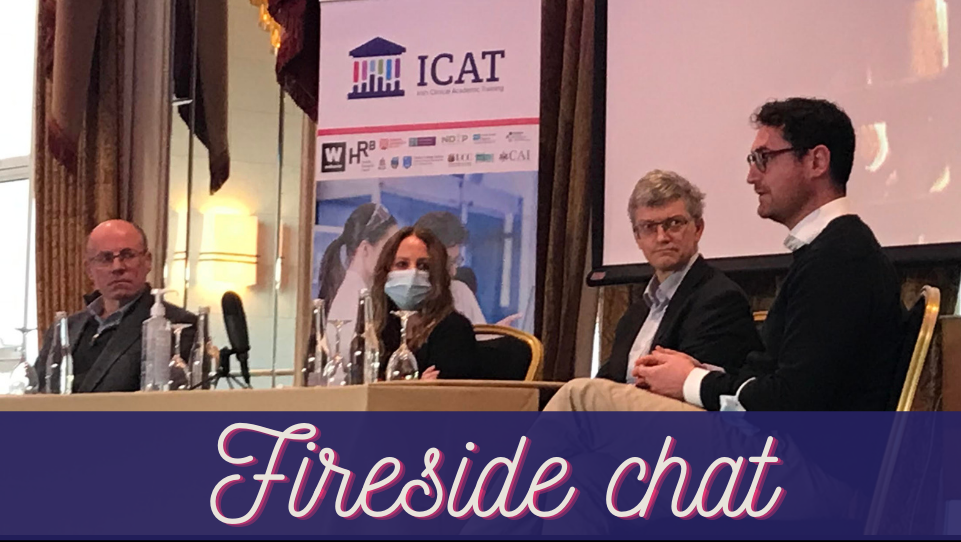
Professor David Dockrell (University of Edinburgh) has been an integral part of ICAT’s Independent Advisory Board since its commencement in 2016, contributing to programme development, the fellowship appointment process and PhD proposal review, and we were delighted to host him at the Retreat this year. The career development talk is the highlight of our annual Retreat, and this year Professor Dockrell gave us an overview of his career in conversation with Dr Áine Merwick (University College Cork), answering questions from the fellows and discussing his moves between Ireland, the USA, and the UK.
In a session that has become an integral part of the Retreat, we held a fireside chat titled Demystifying the Journal Review Process. Our panel members were Professor Bernadette McGuinness (Queen’s University Belfast), Professor Padraic Fallon (Trinity College Dublin), Professor David Dockrell (University of Edinburgh) and Dr Brendan Kelly (ICAT Fellow, UCD). The panel discussed the process behind the scenes when you submit a paper for review by a journal, how editors make their decisions, and how to respond to reviewer feedback. Dr Kelly discussed his experiences during his European Radiology Review Fellowship in 2019, a 6-month training fellowship hosted by the European Radiology journal, and the benefits of getting involved in the review process early in your career.
As ICAT enters its 5th year, the outgoing Programme Director, Professor Michael Conall Dennedy (NUI Galway), gave us an insight into how the programme’s vision was realised by its founding members, how it has developed over the years, and the plans for the next cycle – ICAT-2. Professor Dennedy introduced us to the incoming Programme Director, Professor Deirdre Murray (University College Cork) and thanked those present for their advice and support during his term.

Our three prize winning speakers were:
Dr Helen Fogarty (Royal College of Surgeons in Ireland) “Persistent Endotheliopathy in the pathogenesis of Long COVID Syndrome”,
Dr William Martin (University College Dublin) “Medications Activating Tubular Fatty Acid Oxidation Enhance the Protective Effects of Roux-en-Y Gastric Bypass Surgery in a Rat Model of Early Diabetic Kidney Disease”,
Dr Adam Dyer (pre-PhD, Trinity College Dublin) “Using Systems Immunology to Understand the Variability in Immune Response in Older Nursing Home Residents”.
Invited speaker profiles:
 Professor David Dockrell
Professor David Dockrell
Chair of Infection Medicine, University of Edinburgh
I am a clinician scientist who graduated from Trinity College Dublin and received further training at the Mayo Clinic Minnesota. I am a former Wellcome Trust Senior Clinical Fellow. Before moving to Edinburgh I was co-director of the Florey Institute a cross faculty multidisciplinary centre which focussed on studying host-pathogen interactions in the context of Gram-positive bacteria.
Macrophages play a key role in the pathogenesis of Infectious diseases. We are interested in understanding how key macrophage innate immune functions protect healthy individuals against infection, despite recurring challenge, and how these core responses are perturbed by human disease inducing susceptibility to infection. We believe that by optimising innate immune responses we can limit our reliance on antimicrobial therapy and provide an alternative strategy to that focused on targeting pathogens by vaccine responses or with antimicrobials to which they can develop resistance.
 Professor Dearbhaile Morris
Professor Dearbhaile Morris
Professor of Antimicrobial Resistance and One Health and Director of the Ryan Institute Centre for One Health, National University of Ireland Galway
Professor Dearbháile Morris is Professor of Antimicrobial Resistance and One Health and Head of the Discipline of Bacteriology at the School of Medicine NUI Galway. She is Director of the Antimicrobial Resistance and Microbial Ecology Group and Director of the Ryan Institute Centre for One Health at NUI Galway, member of the scientific steering board of the One Health European Joint Programme, member of the governing board of the Med-Vet-Net Association and member of the National European Antimicrobial Resistance Surveillance Network (EARS-Net) Steering Group. She has over 20 years’ experience of research on zoonotic waterborne pathogens and antimicrobial resistance and has published widely in high-impact journals (h-index 33). She received the NUIG President’s Award for Research Excellence in 2020.
 Professor Cathal Seoighe
Professor Cathal Seoighe
Professor of Bioinformatics at National University of Ireland Galway and Director of SFI Centre for Research Training in Genomics Data Science
Cathal Seoighe is Professor of Bioinformatics in the School of Mathematical and Statistical Sciences at NUI Galway and Director of the SFI Centre for Research Training in Genomics Data Science. He obtained an undergraduate degree in Theoretical Physics and a PhD in Bioinformatics, both from Trinity College Dublin. His research involves the development and application of computational methods for the analysis of genome-scale biological data.
Current research projects include identification of sources and consequences of variation in rates and patterns of germline and somatic mutation as well as unbiased estimation of tumour mutation burden and the predicted impact of variation in mutation signature activity on the burden of immunogenic mutations in cancer. His research group has developed R packages that are widely used in applications such as gene expression deconvolution and dimensionality reduction/mutation signature analysis in cancer genome sequencing data.
 Ms Edel Murphy
Ms Edel Murphy
National Programme Manager, PPI Ignite Network
Edel Murphy is the national Programme Manager for the PPI Ignite Network. Edel has worked in the area of public and patient involvement (PPI) in research for a number of years, working with researchers across all disciplines and with the public to build PPI capacity among both constituencies, delivering education and training and providing support to help researchers understand how to plan for and embed the public and patient voice across their research.
In her current role, Edel is driving the development and growth of an energetic, collaborative and innovative Network, bringing together a diverse range of stakeholders nationally and internationally to build a shared voice for PPI in research in Ireland. She will facilitate knowledge exchange and sharing of skills and expertise across all involved in the Network, as well as conducting wide ranging engagements and two-way dialog with numerous and diverse partner organisations. Additionally, she will lead on the curation of the Network’s online hub, including the PPI Opportunities portal, on the Network’s communications and on establishing the Network’s Public Advisory Panel.
The ICAT Retreat is an important milestone in the academic calendar and feedback provided to fellows is used to further develop their projects and collaborations. We are indebted to the members of our extensive network who support us and our fellows, providing support, mentorship and guidance. Thank-you so much and we sincerely hope that we can get our larger network together in person in 2022.

